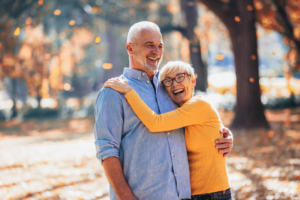Adjusting After the Loss of a Partner
For many seniors, the huge life shift that occurs following the loss of a spouse or partner can be the tipping point at which their need for assistance at home becomes clear. While in the midst of dealing with the grief that comes with such a loss, it can be hard for seniors to accurately assess their own needs and abilities.
It can be extremely difficult to even fathom making such big changes at such a trying time. In these challenging times, support and care from loved ones can make all the difference as seniors work to learn and acknowledge what they need and how they should set up their lives moving forward. In many cases, the assistance of a professional home caregiver is also a welcome addition to help share the responsibility.
Support Through Grieving
Everyone grieves differently, and there is no way to predict how or when the impact of the loss will be felt most deeply. At this crucial time, loved ones and family members can offer a variety of approaches and techniques to provide support to work through the grief.
- Listen: Let your loved one know you are there to lend an ear and a shoulder should they need to talk through their feelings.
- Assistance with Daily Routines: Make sure they know you are willing to help in the practical everyday ways that they need to keep their daily lives going.
- Unconditional Support: Encourage them to express and face their feelings however they need to, and ensure they know you will be there through it all.
- Be compassionate: Patience and understanding helps show they have the support they need to go through the process in their own way, and at their own pace.
- Self Care: Acknowledge and tend to your own grief as a caregiver so that you can care for yourself and be better equipped to support others.
- Share Meals and Activities: Share time together to avoid isolation and even greater loneliness.
Physical Health
Grief can also impact seniors in a physical way, and part of providing care and support is ensuring that physical health is addressed just as mental and emotional wellbeing are.
- Make sure they are well fed and have nutritious food available
- Encourage them to eat, even when the sadness makes it feel too overwhelming to do so
- Accompany or encourage them in keeping active, even in small ways like a short walk
- Inform healthcare professionals of the loss so that they can monitor health in the ways they see fit
Navigating Changes
Seniors who have been with their partners for decades often feel at an utter and complete loss about how to live their daily lives without their other half. There are generally roles filled by each person and ways in which the two individuals support each other’s daily functioning. Not having that person around anymore to contribute may mean that seniors need to learn to do things an entirely different way. In many cases, some form of replacement is needed to fill some of those roles in healthy ways.
Exploring Independence
While all of these changes are undoubtedly overwhelming to think about and navigate, it can be empowering and good for self-esteem for seniors to learn how to do new things and become more competent in areas they weren’t engaged in before. It is all a process, and it will take a while before things start to feel okay again, but they will.
Caregiver Assistance
As a caregiver, it can be beneficial to help identify and address the areas in a senior’s life that need adjustments. Caregivers should take stock of which things seniors already know how to manage on their own, and where the gaps are now that their partner is gone. This helps to fill those spaces and get back to routines which will likely involve some new approaches. Family members, friends, and professional caregivers can take on a range of responsibilities to help with the adjustment period, to develop a new process that works gradually over time.
Next Steps
Seniors who haven’t lived on their own in a very long time will have to make considerable adjustments which can be really challenging both practically and emotionally. Loneliness is a big problem amongst the senior population, and mental and physical health both need to be tended to in their own ways. Making arrangements in the home to better accommodate living alone is often an effective way to improve safety and convenience. Developing routines and opportunities for social connection is also a major part of the adjustment, to ensure that seniors don’t draw too far into themselves in their grief and lose touch with the people and things that bring them joy.
The loss of a partner can be one of the most challenging situations a person ever has to deal with. But with emotional support, practical planning, and an adjustment of roles and routines, seniors can learn to continue living enjoyable and fulfilling lives following loss.



